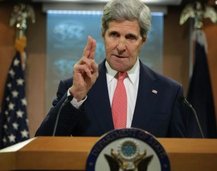Only relatively recently did most Israelis learn about John F. Kerry’s Jewish family roots, information that was met with both astonishment and joy. It seemed to create an instant feeling of affinity. No longer did he embody a superpower, but now it felt as if he shared, at least to some degree, the destiny of the Jewish people. Most Israelis, in my opinion, tend to believe Kerry has an earnest desire to bring peace to this war-afflicted area. They are extremely skeptical regarding the likely success of his efforts, never more so than now, but unlike how they regard some Israeli political figures, they believe Kerry’s motivation is genuine.
This apparent intimacy with Kerry may seem irrelevant. One tends to think of political discussions as driven by rational calculations, national strategy, military tactics and well thought-out political reckoning. But for the Israeli public, both on the right and the left, any change to the political status quo vis-à-vis the Palestinians brings to light latent anxieties that derive from the Jewish past in general, and from the Holocaust in particular. In the eyes of an outside observer this may appear strange; Israel’s massive military force should have demolished this anxiety. But a more careful examination reveals that it still prevails, and materializes in unexpected forms.
Take, for example, the trend these days in Israel to obtain a foreign passport. Israeli-born men and women with parents or grandparents from Eastern Europe, South America or elsewhere, initiating the legal procedures to apply for a passport from states where citizenship is granted on the basis of former generations. It is time-consuming and expensive, but even so, many decide that they want another passport in addition to the Israeli document they already hold. When asked for their resonating, Israelis often reply they want it “just in case” something happens. So what ‘case’ are they talking about?
Make no mistake: Most of them are ardent Zionists, who will, most likely, live in Israel for the rest of their lives, raising children and grandchildren, fully integrated in Israeli society. And if, God forbid, a catastrophe should happen, I am not sure whether they would actually use these passports. The vast majority of these dual-nationality Israelis have never been to the places from whence their forebears came, they don’t speak the language and don’t relate to it in any real way. The passport is, in fact, more of an emotional insurance, a document that would serve them if history was somehow to reverse itself. Since the image of immigration to Israel is embedded in all Israelis, an inverted image is created, of reverse immigration.
Clearly, the rational aspect of these fears is that Israel should make its existence more secure. For me, the only way to do this is by trying to solve the Israeli-Palestinian conflict. Others believe that an increased investment in security measurements should be made, and there are those who wish to expand Israeli sovereignty into the West Bank. But this is beside the point. On an emotional level, both ends of the political spectrum are overshadowed by the horrors of the Holocaust.
It’s arguable that the Holocaust evoked two fundamental responses. One is “Never again”— the weakness of the Jews during the Nazi regime, which led to the extermination of 6 millions Jews almost without resistance, should never be repeated. The idea that ‘Jewish nature’ is weak and should be reformed in a more muscular image is one that has existed since Zionism’s conception in the late nineteenth century, but it was reinforced by the Holocaust. The other response is a moral one – our sufferings should create sensitivity to the pain of others. In my mind, most Israelis, excepting those who identify with far right or left positions, oscillate between these two considerations. Strangely, they coexist, even if they are, sometimes, contradictory.
So Secretary of State Kerry really was attempting to do the impossible. Underlying the endless talks on borders, the release of prisoners, land swaps and economic solutions, Israelis aspire to escape their constant and fundamental fear of the future. And even those who are eager to make peace with the Palestinians, willing to withdraw fully from the West Bank and east Jerusalem, were and are really asking Kerry for the impossible: An insurance against the past. In spite of his exhaustive efforts to bring peace, this kind of psychological closure cannot be achieved.
A word about the Palestinians and the Holocaust. They, too, are overshadowed by this historical catastrophe. Against the background of the concentration camps, their suffering may seem trivial; the Holocaust may appear to delegitimize their pain. But this is a distorted mirror, one which should not reflect contemporary events. The Palestinians have endured much agony, and still do, regardless of whom is to blame for it.
Peace seems many years away from the Middle East. Not that the problems are unsolvable, but it takes much more than a rational analysis to make peopleable to solve them.
This article was published on Haaretz.com (click here).

Thank you, Yasmine. Indeed, all men should feel safe, yet prepare for an unexpected future.
All the best to you!
As ever,I love to read you..And I think that it is so unjust for the people to feel emotionally insecure,even today.However,the history conscience must always be observed,things change suddenly,I know from my own experience.Best regards to you Emanuela!